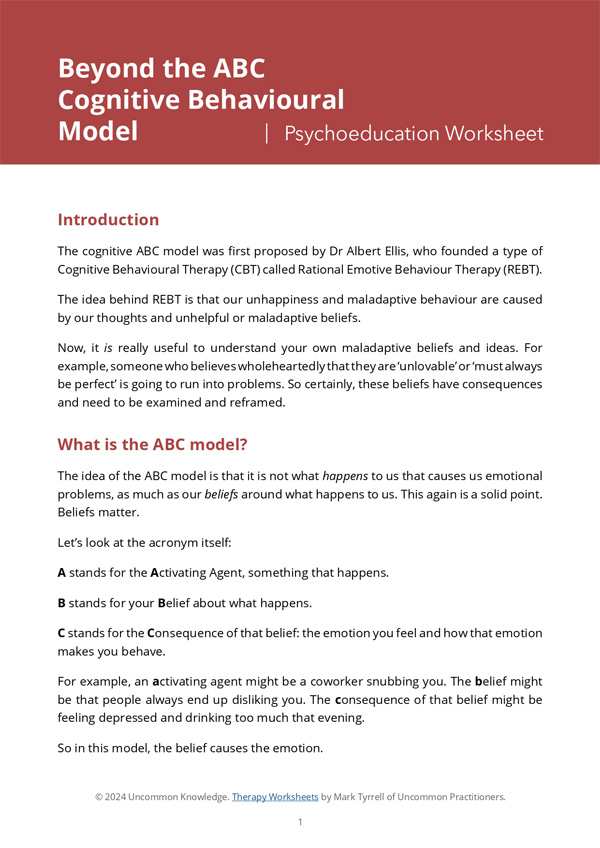Download this free therapy worksheet PDF to help your clients better manage their thoughts and emotions for improved emotional resilience
Cognitive Behavioral Therapy (CBT) and Rational Emotive Behavior Therapy (REBT) highlight that our emotional and behavioural disturbances are significantly influenced by our thoughts and deeply ingrained beliefs.
For instance, pervasive thoughts like “I am unlovable” or “I must always be perfect” can lead to substantial emotional distress and maladaptive behaviours. Addressing these beliefs is crucial as they have direct consequences on one’s mental health and overall wellbeing.
The traditional ABC model of CBT emphasizes that it is not just the events or situations (Activating Agents) that disturb us, but rather our beliefs about these events (Beliefs) that lead to emotional and behavioural outcomes (Consequences). Understanding and restructuring these beliefs can mitigate emotional difficulties and lead to healthier behavioural patterns.
However, the newer APET model from Human Givens Psychology suggests that often emotions themselves can trigger beliefs and expands our understanding of the interaction between thoughts, emotions, and behaviours.
While you explore the worksheet with your client, you’ll answer such key questions as:
- What is the activating event? This question helps clients pinpoint the external situations or internal thoughts triggering distressing emotions, facilitating a clearer understanding of their emotional responses.
- What beliefs are associated with these emotions? Identifying these beliefs allows clients to recognize how their interpretations of events shape their emotional experiences.
- What are the consequences of these beliefs? Understanding how beliefs influence emotions and behaviours clarifies the impact of cognitive processes on overall wellbeing.
Through working with the exercises and questions in the sheet, you and your client will experience:
- Enhanced self-awareness: Aid clients in mapping out the sequence of thoughts and emotions related to specific events, enhancing their awareness and understanding of their cognitive and emotional patterns.
- Targeted interventions: Tailor interventions more effectively to address specific cognitive distortions by examining the beliefs and emotional responses associated with particular activating events.
- Client empowerment: Equip clients with the tools to actively engage in changing their thought patterns, fostering a sense of control over their emotional responses.
The Beyond the ABC Cognitive Behavioural Model Worksheet will significantly enhance your therapeutic approach as you guide your client in examining their cognitive and emotional responses while introducing them to the impactful notion that emotions can generate beliefs. An editable version of this worksheet is free to members of Uncommon Practitioners’ TV.






